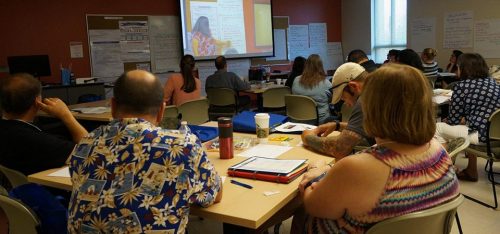|
As a research-based organization, MC2 understands that change and improvement in mathematics teaching and learning results from meaningful, authentic, classroom-based experiences where teacher expertise is recognized and used as a resource for improving practice. Research Question: How does the enactment of the Mathematically Connected Communities (MC2) Capacity-Building Model impact changes in teacher practice and student achievement? |
 |
Research Design: To determine the overall effectiveness of the MC2 Capacity-Building Model, the research and evaluation design for MC2 integrates theories, research, and modes of human learning. It is framed by an understanding of the systemic change process utilizing these approaches:
- Concerns-Based Adoption Model-CBAM (Holloway, 2003)
- Five Critical Levels of Evaluation (Guskey, 2005)
- Four Levels of Learning Evaluation Model (Kirkpatrick, 2007)
- Kotter 8-Step Change Process (NMCCSS Implementation Plan, 2012)
- Leadership Principles for School Improvement and Turnaround (Utah Education Policy Center, 2017)
- Principles to Actions: Ensuring Mathematical Success for All (NCTM, 2014)
- Standards for Professional Learning(Learning Forward, 2011)
Data Collection and Analysis: MC2 uses various types of data to plan, assess, and evaluate professional learning. These data inform the planning and delivery of future professional learning to have greater impact on classrooms, schools, and districts.


